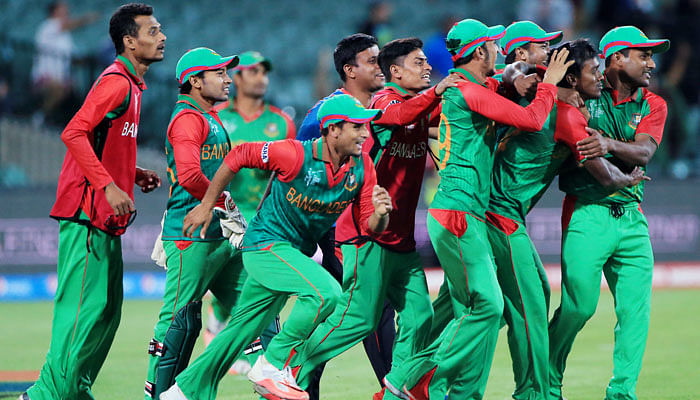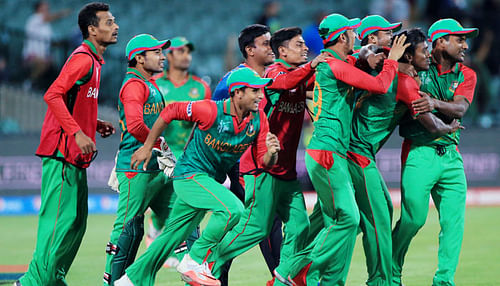
Why Bangladesh fans' backlash at quarterfinal defeat to India is downright ridiculous

The India vs Bangladesh quarterfinal match of the 2015 World Cup has unfortunately been marred by a loud contingent of vehement fans, and as a fellow fan I consider it my duty (nay, birthright) to step forward and debunk the claims that endeavor to debase a sport I’ve ardently loved for a long, long time.
Let us go a few weeks back to another crucial game – Bangladesh vs England. With England on the brink of a shameful group stage exit, they watched with disbelieving eyes as Chris Jordan was given run out. With not much conclusive evidence to sway the decision either way, the benefit of the doubt was impassively snatched from the batsman, who trudged back taking a tiny share of English hopes with him.
The harbingers of ‘justice’ and fair cricket, currently embodied by Bangladeshi cricket fans, were nowhere to be seen. Justice this time, was biased towards them.
England were sagacious enough to see the bigger picture – they didn’t deserve to win. The fact that they lost by a small margin of 15 runs with about 1.3 overs to spare – achievable in most situations with some wickets in hand, should’ve given them enough right to blame the loss on that one contentious decision. Why should they, creators of cricket, sit back and watch favouritism of Bangladesh?
They could’ve castigated the ICC, impeached the governing body, lodged multiple complaints and thrown a huge tantrum. But instead they chose to see the bigger picture; Bangladesh played better in all spheres – batting, bowling and fielding. They played with a passion that England sorely lacked, and they deserved to win.
The Rohit Sharma not-out and the Dhawan catch
Skipping forward, we see prodigious outrage at an umpiring fault on a delivery that was supposed to snatch Rohit Sharma in the India vs Bangladesh quarterfinal. Our affronted harbingers of justice smelled the opportunity, and chose to pounce on it. Was it a wrong decision? Yes. Was it the first wrong decision by an umpire ever? No. Would it have affected the match? Possibly.
Sharma, on 90 at that point, went on to score 137, adding 47 runs to the tally. Bangladesh went on to lose the match by a whopping 109 runs.
Now let us assume, for a very dubious argument’s sake, that every batsman that was going to follow Sharma had he been (rightly) adjudged out possesed the batting talents of Chris Martin, which in itself is a farcical statement considering the Indian lower order contained the likes of Suresh Raina, Mahendra Singh Dhoni, Ravindra Jadeja, Ravichandran Ashwin and Mohammed Shami – a mix of great players to handy batsmen. These were certainly good enough to make up for those 47 or perhaps even make more.
Bangladesh, if I may be audacious enough to remind you, lost by 109 runs.
Another controversial moment in the match was Shikhar Dhawan’s catch to send back Bangladesh’s star batsman Mahmudullah. There was no conclusive evidence that Dhawan touched the ropes (conclusive evidence in this case would be noticeable movement of the boundary rope) and no third umpire can or should ever make a decision on ‘what it looks like’.
Our harbingers of justice, victimized by the apparent partisanship, were fervidly awoken again. Asleep they were, however, when Zimbabwe were knocked out of the World Cup a few days earlier in a match against Ireland when Sean Williams spooned a similar catch to John Mooney at the boundary, pulverizing the hopes and hearts of the Zimbabwean fans.
Many believed that some conclusive movement of the boundary rope could be observed at the point where Mooney’s foot seemed to touch it, and yet Williams was adjudged out. He was on 96, and on course to scripting a historic win for Zimbabwe. Our harbingers of justice didn’t care then, quite unfortunately – Zimbabwe had to go home with much less glory than Bangladesh.
Thin line between passion and blind emotion
It’s good to be passionate about something, because if you’re not, what is life worth living for? But passion needs direction before it becomes blind emotion, and situations like these need that bit of sensible direction. Momentum in cricket is a huge psychological element, but to assume that it would’ve caused Bangladesh to win a match in which India batted, bowled and fielded better is blind emotion.
Such comments, accusations and insults dent the spirit of cricket. If fans criticize the ICC without knowing the current interim president is from their national cricket board, and more so if the ICC President starts speaking as a fan of a particular team and not as a neutral governing authority, cricket is the only entity on the losing side.
Disparaging comments by the Bangladesh PM only further this acerbic emotion, and cricket doesn’t need it.
The Bangladesh cricket team has come a long way, and their journey throughout the World Cup was enthralling to watch. With a young team nurturing a vortex of talent, they have only brighter futures to look forward to, rather than the alleged ‘conspiracy’-ridden pasts they choose to dwell in.